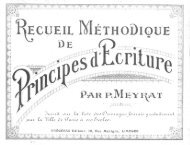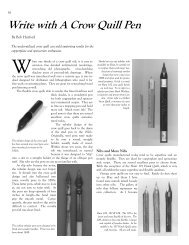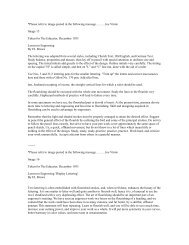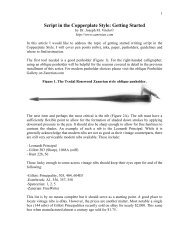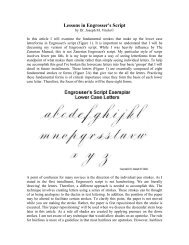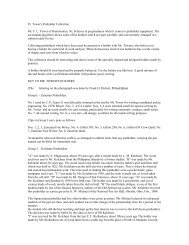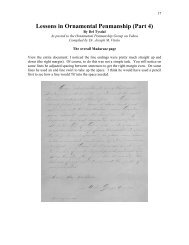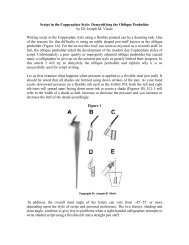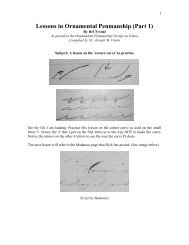The Educator (Volume 45) - IAMPETH
The Educator (Volume 45) - IAMPETH
The Educator (Volume 45) - IAMPETH
You also want an ePaper? Increase the reach of your titles
YUMPU automatically turns print PDFs into web optimized ePapers that Google loves.
14<br />
What is your most difficult penmanship<br />
problem? <strong>The</strong> responses of<br />
8,000 teachers to this question indicate<br />
that the application of good<br />
writing in all writing situations is<br />
our most difficult problem.<br />
Teachers and supervisors of handwriting:<br />
are aware of this fact. I believe<br />
that we are reminded of this<br />
much more frequently than any other<br />
group of instructors. However, the<br />
examination of a thousand manuscripts<br />
of pupils who were requested<br />
to write an original paragraph revealed<br />
the fact that sentence constructon,<br />
punctuation, spelling, and<br />
word usage functioned no better than<br />
the handwriting. <strong>The</strong> teachers of<br />
these skills had not failed, for most<br />
of the papers showed sincere effort<br />
and a passable degree of achievement.<br />
Angelo Patri says, "Any school<br />
child's work should bear the mai-ks<br />
of his apprenticeship, not the finish<br />
of the master. Work that is the expression<br />
of a child's full power should<br />
be marked high and praised as<br />
worthy."<br />
Results Seen at a Glance<br />
<strong>The</strong> reason that penmanship receives<br />
the greatest amount of criticism<br />
can be attributed to the fact<br />
that the results are so readily apparent.<br />
One glance at a page frequently<br />
serves to appraise its worth<br />
with relation to writing. It takes<br />
more minute examination to detect<br />
other faults.<br />
Likewise we find many who would<br />
discount all our efforts because the<br />
child uses a certain amount of finger<br />
movement while we have stressed the<br />
relaxation of the large arm muscles.<br />
Again the finger motion is easily detected<br />
while the movements of the<br />
large arm muscles are mostly a matter<br />
of relaxation and less easily seen.<br />
This defense of our teachers of<br />
writing does not remove the problem,<br />
but is merely offered to remind teachers<br />
of other subjects that we are not<br />
alone in this responsibility. To more<br />
nearly approach its solution should<br />
challenge our most serious thought.<br />
Developing Proper Attitude<br />
To inculcate the ideal of good writing<br />
at all times we must be as much<br />
concerned with the development of<br />
proper attitudes toward penmanship<br />
as we are with the development of<br />
speed and quality. <strong>The</strong> mutual relationship<br />
between handwriting and<br />
other school subjects is very high.<br />
It functions constantly in connection<br />
with the child's general learning activities.<br />
This being the case, these<br />
same activities should form the basis<br />
of motivation for the formal drill<br />
necessary to achieve adequate skill.<br />
:<br />
Penmanship Activities<br />
T. M. MINSTER, GREENSBURG, PA.<br />
Pennsylvania State Teachers Association<br />
Correlation<br />
<strong>The</strong> regular writing class should<br />
be a period of preparation for real<br />
writing situations. If based on problems<br />
vital to the pupils themselves,<br />
interest is immediately aroused and<br />
proper attitudes are largely the result<br />
of interest. For example, the<br />
lesson might be based on capital M.<br />
<strong>The</strong> teacher places the letter on the<br />
boai-d and analyzes it thoroughly.<br />
Proper movement drills are given and<br />
the letter is applied in meaningful<br />
words. All this is very well but if<br />
this procedure is preceded by asking<br />
the pupils to refer to their notebooks<br />
in order to discover their habits concerning<br />
this letter and where to apply<br />
the remedy, the interest is vitalized<br />
and the practice becomes more<br />
purposeful.<br />
<strong>The</strong> comparison of notebooks and<br />
collateral writing with specimens<br />
made in the regular writing class<br />
should be carried out frequently. Is<br />
the comparison satisfactory or unsatisfactory?<br />
All pupils cannot become<br />
excellent writers but all can<br />
make their collateral writing compare<br />
favorably with their specimen<br />
writing.<br />
<strong>The</strong> same opportunties exist<br />
in handwriting as elsewhere to<br />
encourage the cultivation of fine<br />
attitudes and development of<br />
suitable traits of habits and<br />
good character.<br />
Tabulating Results<br />
Convincing evidence of the value<br />
of this activity is shown in the following<br />
study. Teachers under supervision<br />
were requested by bulletin as<br />
follows<br />
Early this month devote a writing<br />
period to the thoughtful inspection of<br />
notebooks, spelling blanks, and tablets.<br />
Base your inspection on neatness<br />
and the observance of principles<br />
taught in the penmanship class.<br />
Make a list of those whose work you<br />
consider satisfactory. Post the list<br />
on the bulletin board. Do this at<br />
least twice this month. List results<br />
below.<br />
First inspection: Number satisfactory<br />
Unsatisfactory<br />
Last inspection: Number satisfactory<br />
Unsatisfactory<br />
<strong>The</strong> tabulation of one hundred<br />
teachers involving the work of 2558<br />
pupils were as follows:<br />
:<br />
First inspection: Number satisfac-i<br />
tory 1501, Unsatisfactory 1057. ><br />
Last inspection: Number satisfac-l<br />
tory 2006, Unsatisfactory 552.<br />
Thus the application of writing]<br />
impioved fifteen per cent in one<br />
month. ;<br />
Selecting Supplementary Material j<br />
Supplementary material for thej<br />
writing class should be selected fi'om<br />
his daily .school studies and activi-j<br />
ties. <strong>The</strong> following report is a sum-i<br />
mary of some of the best ideas sub-i<br />
mitted by teachers in response to the!<br />
question, "How do you provide sup-i<br />
plementary material for your class?"'<br />
(1) Practicing as part of the hand-,<br />
writing lesson, words frequently<br />
missed in the regular spelling class.<br />
(Either group or individual work.)<br />
(2) Re-copying corrected papers;<br />
from English or other subjects.<br />
(3) Letter writing, including notes<br />
to pupils ill at home, invitations to<br />
parents or other classes, "Thank<br />
you" notes, and envelope addressing.<br />
(4) Writing rules, definitions, andi<br />
facts from any subject.<br />
(5) Making provision for individual<br />
progress Ijy permitting best writers<br />
to practice special page writing<br />
for displays, etc.<br />
(6) Placing new words contacted<br />
during day on the blackboard to be<br />
used during the last half of handwriting<br />
class as special supplementary<br />
drill.<br />
Correlating Capital Letter Drills<br />
Good ideas for capital letter drill<br />
were<br />
(1) Practice the names of pupils in<br />
class beginning with the capital letter<br />
studied.<br />
(2) Practice the names of days,<br />
months, dates, and special holidays.<br />
(3) Practice proper nouns from<br />
any subject, and especially from history<br />
and geography, including the<br />
names of prominent persons and<br />
places of history, names of nearby<br />
towns, counties, states, state capitals,<br />
and important cities.<br />
Figure Correlation<br />
Interesting figure correlation can<br />
be had by:<br />
(1) Cori'elating with arithmetic or<br />
number work.<br />
(2) Drilling the date each day for«<br />
two weeks to cover and review all<br />
figures.<br />
(3) Practice writing outstandini<br />
history dates.<br />
<strong>The</strong>se are types of activities thai<br />
constantly keep the need for goo<br />
writing in the minds of the pupils



